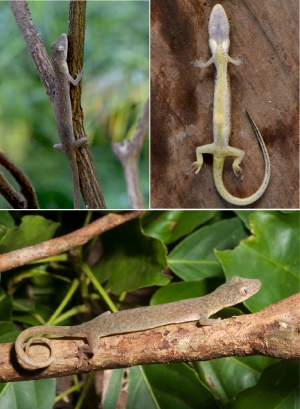 The Philippines possess a remarkable species diversity of amphibians and reptiles, much of which is endemic to this Southeast Asia island nation. Lizard diversity in the family Gekkonidae is no exception, with more than 80% of the country’s gecko species endemic to the archipelago, including the entire genus of False Geckos (Pseudogekko). This small radiation of diminutive, slender, arboreal forest species has been the focus of several recent phylogenetic and systematic studies that have highlighted the prevalence of undocumented species concentrated in several geographical regions within the archipelago. Newly available genetic data have led to the revision of two species complexes in the genus Pseudogekko, one of which is the focus of this study. We describe a new member of the Pseudogekko brevipes complex, which represents the first population from this species group discovered in the Luzon Faunal Region. Because of the species’ secretive nature, rarity, or restricted geographic range, it has gone undetected despite recent biodiversity surveys targeting the central and northern portions of the Bicol Peninsula. We evaluate both morphological and genetic data to support the recognition of the new species. All three members of the P. brevipes complex have allopatric distributions situated within three of the archipelago’s distinct faunal regions. The recognition of the new species increases the total number of taxa in the genus Pseudogekko to nine species.
The Philippines possess a remarkable species diversity of amphibians and reptiles, much of which is endemic to this Southeast Asia island nation. Lizard diversity in the family Gekkonidae is no exception, with more than 80% of the country’s gecko species endemic to the archipelago, including the entire genus of False Geckos (Pseudogekko). This small radiation of diminutive, slender, arboreal forest species has been the focus of several recent phylogenetic and systematic studies that have highlighted the prevalence of undocumented species concentrated in several geographical regions within the archipelago. Newly available genetic data have led to the revision of two species complexes in the genus Pseudogekko, one of which is the focus of this study. We describe a new member of the Pseudogekko brevipes complex, which represents the first population from this species group discovered in the Luzon Faunal Region. Because of the species’ secretive nature, rarity, or restricted geographic range, it has gone undetected despite recent biodiversity surveys targeting the central and northern portions of the Bicol Peninsula. We evaluate both morphological and genetic data to support the recognition of the new species. All three members of the P. brevipes complex have allopatric distributions situated within three of the archipelago’s distinct faunal regions. The recognition of the new species increases the total number of taxa in the genus Pseudogekko to nine species.
Siler CD, Davis DR, Watters JL, Freitas ES, Griffith OW, Binaday JWB*, Lobos AHT*, Amarga AKS, Brown RM. 2017. The first record of the Pseudogekko brevipes Complex from the northern Philippines, with description of a new species from Luzon Island. Herpetologica 73:162–175. [PDF]
